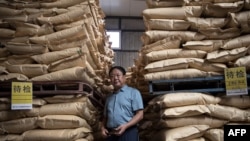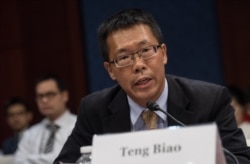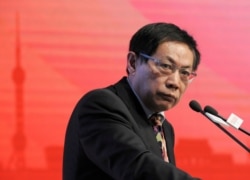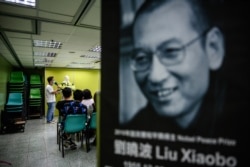Chinese authorities seized control of agriculture conglomerate Hebei Dawu Agricultural and Animal Husbandry Group, once ranked among the largest private enterprises in China.
Company founder and chairman Sun Dawu was arrested November 11, along with more than 20 family members and company executives. Sun was accused of "provoking quarrels and disrupting productions."
Authorities have not explained why the billionaire owner was detained. Posts on Chinese social media networks indicate the company had a land dispute with a state-owned farming entity. But people close to Sun say his well-known pro-democracy ideology likely caused his detention.
Land clashes
In August, workers for the Dawu Group reportedly clashed with a state-owned farm's employees during a land dispute. According to Sun's social media post, more than 20 people were injured.
In an interview after the incident, Sun said the police were clearly in favor of the state-owned farm since "it belongs to the state," but "they are a gang that pursues personal gain in the name of the state."
On November 11, the local police posted on its official WeChat account that Sun, along with other people, had been detained while the case was being investigated.
Wang Yingguo, a Chinese entrepreneur and confidant of Sun, told VOA that even if Sun had a financial dispute with another company, it should be treated as a civil case instead of a criminal case.
"Now, his company has been taken over by the government. The story has become more than the company itself," he said.
Wang said Sun's company has been expanding quickly in recent years, branching out beyond the agriculture businesses that once were the company's focus. The company owns a 20,000-seat stadium and a hospital where Dawu staff and locals can receive health care. Wang said these benefits made Sun popular and threatened the local government's authority.
Wang also said many of the comments Sun posted on WeChat were in favor of democracy.
Teng Biao, a Chinese human rights lawyer in exile, told VOA that Sun has praised the work of imprisoned rights lawyers and has connections with some prominent Xi Jinping critics, including real estate tycoon Ren Zhiqiang, who was sentenced to 18 years in prison in September.
"Sun is one of the few Chinese entrepreneurs who support the rule of law and human rights," Teng said.
In July 2015, Chinese authorities arrested nearly 100 rights lawyers as part of a crackdown that lawyers said was an assault on the legal profession.
In a commentary after the incident, Sun wrote, "What problem does this reflect? I think this is a contradiction between 'maintenance of stability' and 'maintenance of rights.' "
Run-in with police
This is the second time Sun has been detained by the police.
In 2003, when he was looking for a bank loan to help expand his business, he found no willing lenders. Instead, between January 2000 and May 2003, the Dawu Group borrowed around $30 million from friends and neighbors, with an IOU at an interest rate higher than banks.
Wang said this private lending practice is protected by law, but authorities charged Sun with illegal fundraising.
Sun was convicted at first. The case triggered an outpouring of public support, which his lawyers believe helped suspend his sentence.
Human rights activist Liu Xiaobo, who was awarded the 2010 Nobel Peace Prize while he was in prison, wrote an article about Sun's case in 2003.
"Sun Dawu has the conscience to despise power-money transactions and the courage to speak up. He has both economic resources and organizational capacity, as well as ideas to fight for the rights of farmers and help them get out of poverty. He calls for political reforms from the perspective of constitutional democracy, making him a great political challenge to the current system and likely a new type of rural leader."
Liu died of cancer in 2017.
In February, Xu Zhiyong, a famous rights lawyer who defended Sun in 2003, went missing. Fellow activists suspect he was arrested and charged with subversion.
Familiar pattern
Exiled rights lawyer Teng said Sun's latest detention follows a pattern in China.
"Almost all cases of political prisoners and prisoners of conscience, and cases in which activists have been sentenced, refer to speech and human rights activities as 'provoking quarrels.' In fact, they do no harm to society and even promote the rule of law and human rights progress in society."
Chinese officials reject this allegation and insist that China is a country that guarantees rights in its constitution and that relies on the rule of law.
Critics point out that the Communist Party is the ultimate authority in the country, which undermines the legal system.
Teng said that without an independent judicial system, judges will do whatever the party says.
"[In China], police, prosecutors and the courts work as one," he said.
Adrianna Zhang contributed to this report.







